With the exception of the Surma Scholarship for Long-Term Healthcare Administration in Policy and Aging, these are merit-based scholarships offered to master's students during the recruitment process or awarded to returning students within HPM. Awards are determined by the program directors for the MPH and MHA programs.
All Pitt Public Health students are eligible for the Surma scholarship, and must have demonstrated career interests in aging services, specifically related to health policy or health management. Applications are reviewed and awards are determined by the vice chair for education in HPM.
The Dawn Gideon Scholarship for MHA Students
Provides scholarship assistance for students in the MHA program whose talents lean towards creative problem solving and an understanding of the value all individuals bring to the process.
After Dawn Gideon's death in June 2015, her husband, Kevin Altomari, along with family, friends, and colleagues, founded the Dawn Gideon Foundation. This organization seeks to provide a forum for the development of hospital administration professionals. It has provided generous support to establish an annual lecture series as well as scholarships for students in the Department of Health Policy and Management at Pitt Public Health.
- Donor Spotlight: Dawn Gideon

Dawn Gideon, managing director in business services A graduate of the University of Pittsburgh Graduate School of Public Health’s Hospital Administration program, Dawn Gideon built an extraordinarily successful career that was sadly far too brief. She began her career in Pittsburgh with Forbes Health System and following their merger with Allegheny Health she assisted them through bankruptcy. After she founded Transition Management Group (TMG) she embarked on a career that focused on cash distressed hospitals and their survival. She later sold TMG to Huron Consulting Group where she continued her work of finding new and creative tools for the survival of healthcare organizations. In between two periods with Huron Consulting Group as a managing director in business services, Gideon returned to Pittsburgh as the chief operating officer for Allegheny Health Network, helping them to avoid bankruptcy and lay the groundwork for a pathway forward. Diagnosed with cancer, Dawn continued her work inspiring those around her by her courage and passion. The Dawn Gideon Scholarship is funded by the Dawn Gideon Foundation, founded by family, friends, and colleagues. The foundation seeks to provide a forum for the development of hospital administration professionals. Gideon was devoted to creatively solving complex business problems in the healthcare environment. Her unique talents continue to be recognized by such entities as the Harvard Business Review, which uses some of her early work as a case study for health care.
- Natasha Shah (MHA '24)
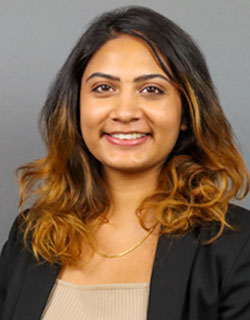
Natasha Shah (MHA '24) Natasha Shah graduated from the University of Maryland-College Park with a degree in community health. As an undergraduate she found interest at the intersection of public health and health policy. She says being a Gideon scholar allowed her leave a full-time job in Washington, D.C. and relocate to Pittsburgh to join the MHA program. “I have always been interested in helping communities that are underserved and being an advocate for those who don’t have a voice in maintaining their health,” said Shah. “The Dawn Gideon Scholarship has empowered me to do just that.” She says the scholarship has allowed her to connect with like-minded female scholars who are going to make an impact in the health care field in a range of cities around the country.
- Emily Maurer (MHA/MBA '25)
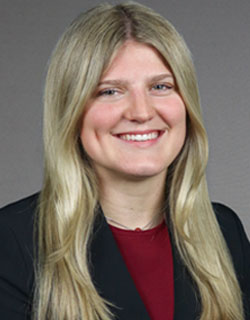
Emily Maurer (MHA/MBA '25) Emily Maurer graduated from Duquesne University with a bache¬lor’s degree in health administration and minors in public health and marketing. As an undergraduate, Maurer interned at West Penn Hospital supporting and helping patients in the Hospital Elder Life Program. She has also been an administrative intern at the Sharon Regional Health System working with several departments. Maurer says her experiences have inspired her to focus on improving care standards and advocating for patients.
- Alexa Skokowski (MHA '25)
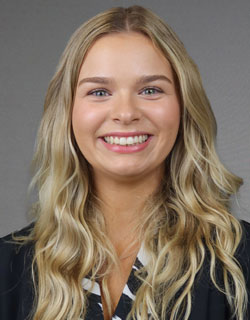
Alexa Skokowski (MHA '25) Alexa Skokowski graduated from the University of Pittsburgh with a Bachelor of Arts in Health Services and certificates in Nonprofit Management and Global Health. During her undergraduate career she spent time working as a mobility technician at the Medical University of South Carolina in Charleston. This experience led to her interest in hospital operations and improving patient satisfaction. Alexa currently works for UPMC as a hospital transfer coordinator where she has become familiar with healthcare systems of Western Pennsylvania and the surrounding areas. This position has exposed her to the capacity and staffing issues that hospitals are currently facing.
- Makenzie Postma (MHA ’25)
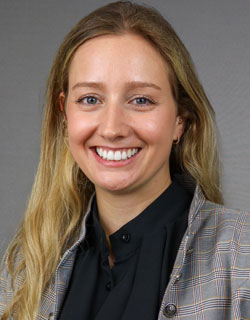
Makenzie Postma (MHA '25) Makenzie Postma graduated Magna Cum Laude from the University of North Carolina at Charlotte with a Bachelor of Science in Biology, Bachelor of Arts in Spanish, and a minor in Psychology. For the past three years, she has worked for Oak Street Health, a primary care clinic operating under a value-based managed care model, improving health outcomes and care quality, lowering medical costs, and improving the patient experience. She has always intended to work in healthcare and become a physician. However, the timeline for medical school has been flexible, as she wants to be the best physician she can be and take advantage of every opportunity, thus adding on three years of work experience and graduate school. Her hope is to attend medical school in the same state in which she completes her graduate school degree. Her long-term goal is to become a Chief Medical Officer eventually or in another role within medical leadership. As someone who will make decisions for others, she needs to know that those decisions are practical and efficient for clinical teams. One way to do this is to have the ability to apply specific operating procedures made by non-clinical leaders in patient settings and provide feedback as the clinician.
- Past Gideon Scholars
-
Jordan McBride (MHA/MBA '21)
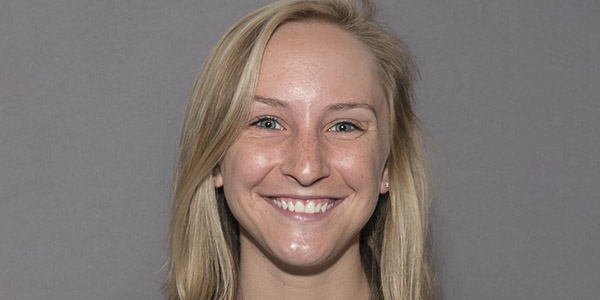
Jordan McBride was born in Pittsburgh but is from Atlanta, Georgia. She has a BS in nutrition science from the University of Georgia. After graduation, she wanted experience in direct patient care and sought certification as a medical assistant, gaining clinical work experience. She became curious about the business side of the health care system and sought a business-focused health care degree. That curiosity, of course, led her to pursue a joint degree option, combining the MHA with an MBA from Pitt’s Katz Business School. She wanted to learn new things and capitalize on the diversity of the other students in each program.
McBride chose Pitt because Pittsburgh is a complex health care city, and because of the strengths and networks of both Pitt Public Health and the business school, including access to local health care leaders. Her interests lie in data analytics and strategy. While she hasn’t yet picked a topic for her thesis, she’s interested in risk adjustment and is thinking about a topic that would explore how risk adjustment impacts the health insurance sector financially and in terms of quality. She’s currently working as a resident at Gateway Health in the risk adjustment department, focused on revenue optimization. “I enjoy that risk adjustment is challenging and there are many complex facets…there is always something new to learn and requirements to consider multiple stakeholders.”
Being a Gideon scholar gives McBride an extra level of motivation and an additional network to diversify and enrich her experience. She was honored to receive the scholarship and feels incredibly supported by the Dawn Gideon Foundation, both academically and professionally. With a network of women that meets regularly and discusses topics like resilience, meaningful networking, accountability, mentorship, self-awareness, and self-care helps McBride find balance in all aspects of her life.
“I hear stories from successful women in the health care field and can apply their experiences to my own situations in both academic and professional environments. I feel that I am meeting people with whom I will have a lasting relationship and I am looking forward to participating as a mentor in the future.”
Through the work of the foundation and the honor of the scholarship, McBride is also motivated by Gideon herself. “Dawn Gideon inspires me because she never took the easy route in her career. She was a problem solver, and worked to turn around cash-distressed health care systems. Most individuals would be afraid to take on a role in a company that is plummeting, but Dawn saw this as a challenge and she wanted to help the organization overcome,” said McBride.
McBride’s hobbies include traveling, sports, yoga, and baking. McBride's father played college basketball with Gideon's brother at Washington and Jefferson College.
Emily Joseph (MHA '20)

Emily Joseph is originally from Columbus, Ohio and has a bachelor’s degree in public affairs from Ohio State. After graduating, she worked in a variety of areas focused on social entrepreneurship and workforce development for the formerly incarcerated, education policy and politics, and ultimately right before graduate school, a health system in New England. These jobs were a perfect lead in to a master’s in health administration because of a core similarity: they were all focused on how systems impact people’s lives. Joseph wanted to leverage her existing knowledge while learning more about health systems operations in order to apply that to the work she was already doing.
UPMC’s Department of Medicine, where Joseph works now while she’s in school, is comprised of thirteen different divisions but she’s most enjoying working on the physician or provider side. “I think I would really be happy post-graduation staying in the physician provider side of the organization and then ultimately I’d just like to be in a position that has a lot of ability to influence how resources are used in health care. So whether that’s at a system level where you have multiple hospitals or systems that report up to you, or on the health plan side, I think there are a lot of different opportunities to apply resource management and operations management in health care in ways that can more efficiently direct how we provide care to patients,” Joseph said of her career aspirations.
The MHA program is helping her to do that through a balance of hard skills in the classroom and exposure to real-world practitioners through both the MHA program and also through the Dawn Gideon Foundation. “The foundation has done a lot of work to expose the scholars to people who knew Dawn Gideon and it’s been really wonderful to hear about her impact on their lives, whether they’ve been people that she’s personally mentored or just her close friends from her own graduate school experience that kind of followed in her career footsteps or grew in life with her.”
With her degree, Joseph plans to continue taking a systems-based approach to public health. “When I think about public health, I think about all of the systems that need to work together so that a person can achieve health. I think that it’s often not just the actual health care delivery system but a lot of the social systems and social supports that go along with it. You can’t be healthy if you don’t have a place to live.” People outside of public health often think of the field in terms of county health departments and vaccine fairs but Joseph is among those connecting “how a hospital works with a housing agency and works with the court system to ensure that all of those parts and pieces work together to promote a healthy environment and a healthy community that everyone can benefit from.”
When she’s not working or studying, Joseph enjoys baking bread and hosting dinner parties with her husband.
Zoe Kaufman (MHA '19)

Zoe Kaufman (MHA '19), a Connecticut native, has recently moved to New York City to begin her career in health administration. She currently serves as a data analyst at New York Presbyterian Hospital. Immediately prior to the move, she received her Master of Health Administration degree from the University of Pittsburgh in 2019. While at Pitt, she served as the Pitt Public Health Alumni Relations Committee representative and was active in the Pitt Public Health Student Government Association, where she served as the social chair. At the undergraduate level, she received Magna Cum Laude honors for her Bachelor of Arts degree in History with a minor in Entrepreneurship from the University of Connecticut. In the near future, she is eager to become involved in local organizations. Beyond academics, Zoe has a passion for traveling the world, reading, and playing golf.
Kristin Free (MHA '18)

Kristin Free is a Pittsburgh native with a BPhil in rehabilitation science and a BS in psychology from Pitt. She was drawn to Pitt Public Health for graduate school partly because she was already a Pitt student – she liked Pitt as an undergraduate and so she wanted to stay. The MHA program was also a strong draw. “I really liked the program because there was a lot of emphasis on evidence-based literature and practice,” said Free.
While she was here, she also completed the global health certificate, focusing some of her school work in the global realm. She traveled to Peru with a handful of other members of the Health Policy and Management Association student group and an organization called MedLife, bringing basic medical interventions into low income areas. The students set up clinics and helped doctors – even building a set of stairs to help with infrastructure.
Today, she works at the Allegheny Health Network as an analyst on the strategic analytics team and really enjoys touching on different areas of the organization. “I tell stories with data. We make quick, easy to interpret dashboards that allow people to quickly consume data without being overwhelming, so that way leadership is making data-based decisions.”
Free isn’t sure what might come next in her career. “I always say I don’t know what I want to be when I grow up. From every experience, you change a little bit. I started out in undergrad wanting to be a vet, so that’s very different from what I’m doing now.” But she does know that she has the support of the Dawn Gideon Foundation network. She was the first Dawn Gideon Scholar, and so she got to give her own input into what would be helpful for the scholars and today she serves on the board. The program they’ve built provides scholars with an invaluable network of mentors that are ready to act as sounding boards and that the scholars can get to know, feel comfortable reaching out for advice.
“I think that Dawn left an incredible legacy. Every time I mention the foundation, I’m running into people who personally knew Dawn and every single person I run into has a great story about her and had great interactions with her. And through all of these stories, I’m not only learning through the resources that the foundation has given me, but also through Dawn herself, which is really cool. Especially working at AHN and her connections there – it’s kind of cool to see that.”
Free is secretary of the Greyhound Health Initiative and recently bought a house built in 1888, so projects around the house have taken over her life. “I’m learning to do stuff that I had no idea…lots of YouTube. You can learn anything!”
Nathan Hershey Endowment in Health Administration
The Nathan Hershey Endowment in Health Administration is an annual award granted to a full-time student enrolled in the Master of Health Administration (MHA) program. Secondary criteria shall include need.
- Donor Spotlight: Nathan Hershey

Nathan Hershey,
professor of health law (emeritus), Health Policy and ManagementNathan Hershey, a graduate of New York University (1950) and the Harvard Law School (1953), held membership in the Pennsylvania bar. He co-authored The Hospital Law Manual, Human Experimentation and The Law (1976), and Hospital-Physician Relationships: Case Studies and Commentaries on Medial Staff Problems (1982), and edited the Hospital Law Newsletter. Hershey served as president of the University of Pittsburgh Senate from 1998-2001. He was also a member of the Institute of Medicine of the National Academy of Sciences, served as president of the American Academy of Healthcare Attorneys (1972), and was continuously listed in The Best Lawyers in America since 1993.
Remembering a Health Law Pioneer
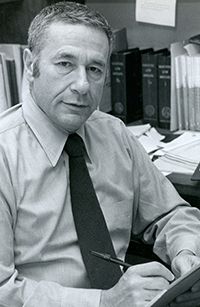 Nathan “Nat” Hershey’s death marked the passing of an era at the University of Pittsburgh. An intellectual force and superb teacher during decades of services at Pitt, Hershey died on April 15, 2017, in Austin, Texas, due to complications from a fall. He was 86.
Nathan “Nat” Hershey’s death marked the passing of an era at the University of Pittsburgh. An intellectual force and superb teacher during decades of services at Pitt, Hershey died on April 15, 2017, in Austin, Texas, due to complications from a fall. He was 86.Hershey played an integral role in founding the modern-day field of health law, which regulates what is now the nation’s largest industry. After earning a JD from Harvard Law School in 1953, Hershey served in the Army as well as at a New York law firm. He joined Pitt as an assistant research professor of health law in 1958, and in 1968, was named director of the health law training program. He was appointed professor of health law in the Department of Health Policy and Management in 1971.
Hershey coauthored the Hospital Law Manual, which for more than 40 years has been the definitive guide to the legal responsibilities and liabilities of health care providers. It was the first codification of health policy law and ultimately would form a critical part of what is today the LexisNexis database, the world’s largest electronic database for legal and public-records-related information.
Among his many publications were Hospital Law Manual, Human Experimentation and the Law (1976) and Hospital-Physician Relationships: Case Studies and Commentaries on Medical Staff Problems (1982). Hershey also was an elected member of the Institute of Medicine at the National Academy of Sciences.
Pitt Public Health alumni who were fortunate enough to count themselves among Hershey’s many students remember him as larger than life and an outstanding teacher. “We were absolutely in awe—our teacher was the guy who created the health law field,” said Mike Evans (HPM ’80), managing principal of Revenue Cycle Solutions LLC. “He was a brilliant, great teacher.”
Becky Surma (HPM ’81), a member of Pitt Public Health’s Board of Visitors, echoed that sentiment. “All of us have teachers that we remember very fondly who make a difference in our lives. Nat was one of those,” she said. “He really challenged every one of us to think outside the box, to not be complacent, to say ‘Let’s examine this from all sides.’ He was very demanding, very challenging.”
Hershey earned a reputation not only as a valued and dedicated professor but as a force at the highest levels of faculty administration at Pitt, serving on the University Senate for 20 years. He spent the maximum three terms each as vice president and president and—never afraid to be a “thorn in the side” of University leadership when it came to faculty concerns—championed the Senate’s role as an equal partner in campus decisions.
“He was a giant on campus because he was willing to stand up for the faculty,” said Eleanor Feingold, senior associate dean. “Whatever issue was contentious on campus, Nat was out there making sure the leadership knew how the faculty felt about it.”
- Natasha Shah (MHA ’24)
-

- Katie Wallace (MHA ’24)
-
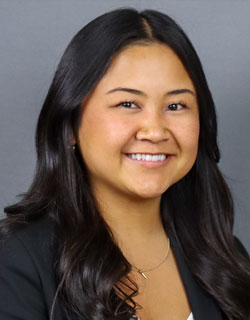
- Noah Lohman (MHA ’24)
-
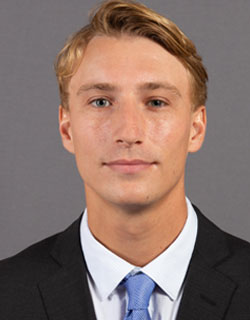
- James Gray (MHA ’25)
-
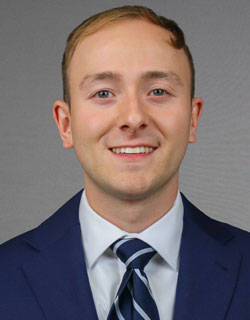
- Past Hershey Awardees
-
Molly Shiflet (HPM '19)

“From a very young age I knew I wanted to pursue a career in service and helping others, says Molly Shiflet. “The field of public health seemed like a perfect fit.”
Now an MPH candidate in the Department of Health Policy and Management at Pitt Public Health, Shiflet credits her parents, both military veterans, with demonstrating purpose and fulfillment through serving their country as well as instilling in her a sense of duty to use her knowledge and skills to help others. She enrolled at Clemson University with an “undeclared” major, but decided on health science with a concentration in health services administration after taking an introductory public health course her freshman year.
When the time came to look at graduate schools, Shiflet says she immediately was drawn to Pitt Public Health for its strong national reputation and “seemingly endless” opportunities for students. “However, I had never been to Pittsburgh, and my only knowledge of the city was the common misconception of its being ‘a dirty old steel town,’” she says. Purely by chance, her sister decided to run the Pittsburgh Marathon, and Shiflet went along to support her. “I instantly fell in love with the city, and I knew that Pitt Public Health was where I wanted to be!”
This past summer, Shiflet completed an internship in Barcelona, Spain, where she was able to see the inner workings of a health care system drastically different from that of the United States while gaining a deeper understanding of another culture. She says as a student at Pitt Public Health, she hopes to take full advantage of the wide variety of practicums and residencies, research positions, and volunteer opportunities available to students to help her to narrow down her specific career aspirations.
“My primary goal is gain the knowledge and skills that will enable me to make valuable contributions towards improving the overall health of my community,” she says. “The supportive network of alumni, faculty, and current students here at Pitt will definitely empower and enable me to do just that.
“I decided to pursue an MPH largely because of the career versatility that comes along with it. Whether I decide I want to be advocating public health policy, running a nonprofit, or managing a health care organization, I know I can use my MPH degree to get me there.”
Manasa Pallapolu (MHA '19)

Manasa Pallapolu discovered she had an interest in health care administration while on the pre-med path at Drexel University. After graduation, the Fairfax, Va., native worked as the head of medical billing at a psychiatric office, where she was exposed to “a completely different side of health care.” She decided to return to school to pursue a Master of Health Administration (MHA) degree.
“I wanted an established program with an extended residency component,” she says. “I wanted to go to a school that had strong connections to a top hospital network or insurance company. When I was looking at where alumni ended up in their careers, I knew [the MHA program at Pitt Public Health] would be a good program for me.”
Pallapolu already has benefited from the Department of Health Policy and Management’s widespread connections with major health care organizations like UPMC. During her first week in the program, she and her classmates met with top administrators at UPMC Presbyterian hospital, who took time out of their busy schedules to talk with them and give them a tour. Through her extended residency at Children’s Hospital of Pittsburgh of UPMC, she is able to spend 18 months working on various projects side-by-side with top executives like Nick Barcellona, vice president and chief financial officer of Children’s Hospital and Children’s Hospital of Pittsburgh Foundation.
“The fact that this administrator is willing to act as my preceptor and guide me through the residency is amazing,” says Pallapolu. “I have friends in other MPH/MHA programs throughout the country, and they do not nearly have the experience that we have access to. A lot of other programs do not have the extended residency or it is unpaid and is the equivalent of a college internship. At Pitt, I am getting the best experience possible, and I am treated as another member of the team and not like a student.”
Pallapolu appreciates the relevancy of her course work—that she can immediately apply what she’s learning to her residency—as well as the open dialogue students enjoy with faculty members like Associate Professor Kevin Broom through monthly roundtable discussions that address problems and “hot topics” in the program. She also loves her new city and says she was surprised by how nice Pittsburghers are, how excited they get when they find out she’s a Pitt student, and how safe and comfortable she feels.
Upon graduation, Pallapolu hopes to complete a fellowship or go into health care consulting and take advantage of HPM’s vast alumni network. “The program has set me up with great mentors that have experience with fellowships and consulting positions,” she says. “I know I have a point person to answer all of my questions in those respective companies and career paths.”
Hunter Group Health Policy and Management Student Scholarship Award
This endowed fund provides tuition assistance for students in the Department of Health Policy and Management.
- Donor Spotlight: David Hunter
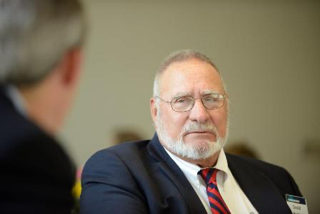
David Hunter,
Senior Managing Director
and Principal of The Hunter GroupDavid Hunter served as senior managing director and principal of Hunter. In addition to leading The Hunter Group, first as president and then as chairman, Hunter personally directed The Hunter Group’s most complex projects involving academic medical centers, public hospitals, large systems, networks, HMOs, and large medical group practices. He has been a leader in the health care field for more than 35 years, with experience as a senior executive in rural hospitals, community hospital systems, and academic medical centers.
The Thomas and Jody Priselac Endowed Fund for Healthcare Leadership
Provides support for MHA students participating in selected professional and leadership development activities nationally, including professional association conferences, academic team competitions, professional networking, and other health management career path opportunities.
- Donor Spotlight: Thomas M. Priselac
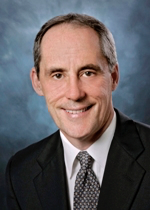
Thomas M. Priselac,
President and CEO, Cedars-Sinai Health SystemThomas M. Priselac is president and chief executive officer of the Cedars-Sinai Health System—a position he has held since January 1994. Prior to being named president and CEO, he was executive vice president from 1988 to 1993. Throughout his career, he has been a leader in the development of strategic and operational innovations to foster high quality, safe and efficient health care as well as being actively involved in health care delivery and finance policy development. He is the holder of the Warschaw/Law Endowed Chair in Healthcare Leadership at Cedars-Sinai Medical Center.
Surma Scholarship for Long-Term Healthcare Administration in Policy and Aging
This endowed fund provides tuition support to graduate-level School of Public Health students who are Pennsylvania residents and have demonstrated an interest in long-term health care administration or policies.
- Donor Spotlight: Elizabeth (Becky) Surma

Becky Surma Elizabeth (Becky) Surma holds a Masters of Public Health from the University of Pittsburgh, with an emphasis in health administration. While she worked as a hospital administrator in her early career, most of her adult life has been devoted to being a community volunteer. Surma has an avid interest in programs and services for seniors. She has served on the board of directors of the Baptist Homes Society for over twenty years, chairing the board from 2008 to 2011. She now serves on the board of the Baptist Homes Foundation and was recently elected to serve on the boards of the Jewish Healthcare Foundation and Health Career Futures. She works with United Way on issues relating to aging and vulnerable seniors, and currently serves as co-chair of United for Caregivers. She has served on the Pitt Public Health Board of Visitors since 2007.